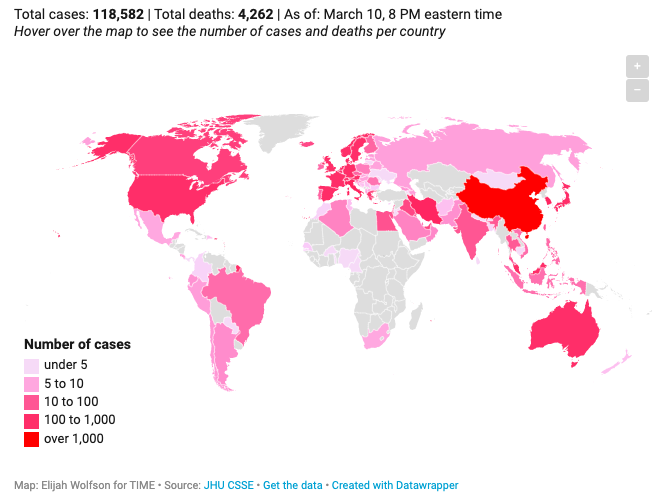The World Health Organization (WHO) has officially declared COVID-19 as a pandemic, which is described as the worldwide spread of a new disease.
“Pandemic is not a word to use lightly or carelessly. It is a word that, if misused, can cause unreasonable fear, or unjustified acceptance that the fight is over, leading to unnecessary suffering and death,” said Dr. Tedros Adhanom Ghebreyesus, Director-
As there are now over 118,000 cases of COVID-19 in 114 countries around the world, with vast consequences in Italy, South Korea, and the United States, WHO urges countries to lean on pandemic preparedness plans to respond to the rise of the disease.
“We have called every day for countries to take urgent and aggressive action. We have rung the alarm bell loud and clear,” continued Dr. Tedros at the official announcement.
“81 countries have not reported any #COVID19 cases, and 57 countries have reported 10 cases or less. We cannot say this loudly enough, or clearly enough, or often enough: all countries can still change the course of this pandemic (…) “Some countries are struggling with a lack of capacity. Some countries are struggling with a lack of resources. Some countries are struggling with a lack of resolve,” sentences Dr. Tedros.
The last time the WHO declared a pandemic was during the H1N1 outbreak in 2009, The Verge reports, which infected nearly a quarter of the world’s population. However, that decision was criticized for creating unnecessary panic. SARS was not considered a pandemic, despite affecting people in 26 countries.
Media briefing on #COVID19 with @DrTedros. #coronavirus https://t.co/aPFXT3ex5y
— World Health Organization (WHO) (@WHO) March 11, 2020
Click here for the full briefing from Dr. Tedros Adhanom Ghebreyesus.
When does an epidemic become a pandemic?
Market Watch writes that as soon as local health authorities detect an outbreak of a disease, they start an investigation to determine exactly who is affected and how many have the disease. They use that information to figure out how best to contain the outbreak and prevent additional illness.
An epidemic is an outbreak over a larger geographic area. It’s big and spreading. In the most classical sense, once an epidemic spreads to multiple countries or regions of the world, it is considered a pandemic. It becomes international and out of control.
TIME reports that SARS-CoV-2, the virus that causes COVID-19, is thought to have first jumped from an animal host to humans in Wuhan, China. At least at first, most cases were seen within China and among people who had traveled there, as well as those travelers’ close contacts. While these cases were concerning, they did suggest a pandemic, because there was not significant spread outside of China, but as the total number of infections rose, so too did the number of cases that spread from person-to-person within communities around the world. Cases have now been confirmed on every continent except Antarctica, and secondary disease hotspots have emerged in places such as South Korea, Italy and Iran.














